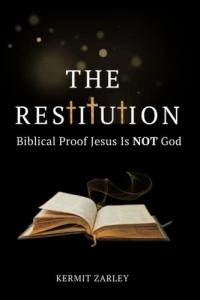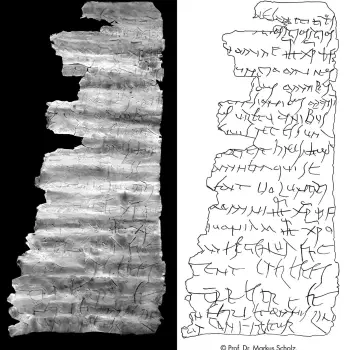 My book, The Restitution: Biblical Proof Jesus Is NOT God (570 pp.), is available at amazon.com where it just received this stellar review from a pastor named A. Pull:
My book, The Restitution: Biblical Proof Jesus Is NOT God (570 pp.), is available at amazon.com where it just received this stellar review from a pastor named A. Pull:
Reviewed in the United States on January 25, 2024
After a Trinitarian theologian said to me, “when you believe in the Trinity, you have to say dumb things,” I started to wonder if maybe there was an alternative way of interpreting the Bible as true which doesn’t require saying dumb things. I’m still working through that question, and I am immensely thankful for this book as part of my study.
For context, it might be helpful to know that I read this book as an evangelical pastor with 10 years of pastoral experience. I earned a M.Div degree from Trinity Evangelical Divinity School, where I learned to study Greek and Hebrew. I accept the presupposition that the Bible is true and reliable and ought to authoritatively define our understanding of God.
Here’s what I appreciated about this book:
1. Zarley directly states that he writes from a conservative view of the Bible. “For instance, I treat all of Jesus’ sayings in the NT Gospels as historically authentic or reasonably representative of His ‘voice’.” (p. xiv). Nowhere did I find Zarley say or even imply, “well, probably the Bible was just untrue here.” His mission is to offer alternative explanations for the Biblical witness without undermining the authority of the Scriptures. I’m not at all interested in someone who will say “the Bible is unreliable, and if you read these apocryphal writings, you’ll discover the ‘real’ truth.” Thankfully, Zarley takes the Bible seriously and does not discount it for the sake of winning arguments. He does delve into textual criticism on a few points, and I think he does so quite appropriately.
2. The author interacts directly with a huge variety of scholars who both agree and disagree with his conclusions. He appears to offer the best arguments from Trinitarians that were available to him. I never got the sense that he was using “straw man” tactics.
3. He goes right after the “hardest” texts for a non-Trinitarian to explain. While he does of course make a case for why the reader should consider a non-Trinitarian belief system based on some questions the Bible raises, the bulk of the book is spent exegeting the New Testament passages that seem to most clearly require a Trinitarian position. This doesn’t mean he’s interacted with every possible text (a friend pointed out to me 1 Corinthians 8:6 as possibly a Trinitarian exegesis of Deut. 6:4), but by and large he doesn’t appear to have purposely neglected any of the most familiar texts that seem to directly indicate Trinitarianism.
4. This is a dense, thick, methodical read. He’s not putting forth a quick conspiracy theory to sell a few books and make a quick buck–there is real substance here. Most people probably don’t have the patience for this kind of writing and depth, but for those who are looking for some well-thought-out positions, you will find this pretty satisfying.
5. I did not agree with every argument he made, but I learned a ton from him about church history, theology, and Scripture from this book. I felt he was fair and reasonable in his treatment of the subject.
Make no mistake: this is not a casual read, and it is also not likely the kind of thing a non-Trinitarian could hand to a Trinitarian friend to “convert” them. However, if you like to weigh out tough questions, and are the kind of person who means it when they say, “OK, make your best case for _______ from the Bible,” you’ll find a pretty well-developed case here.













